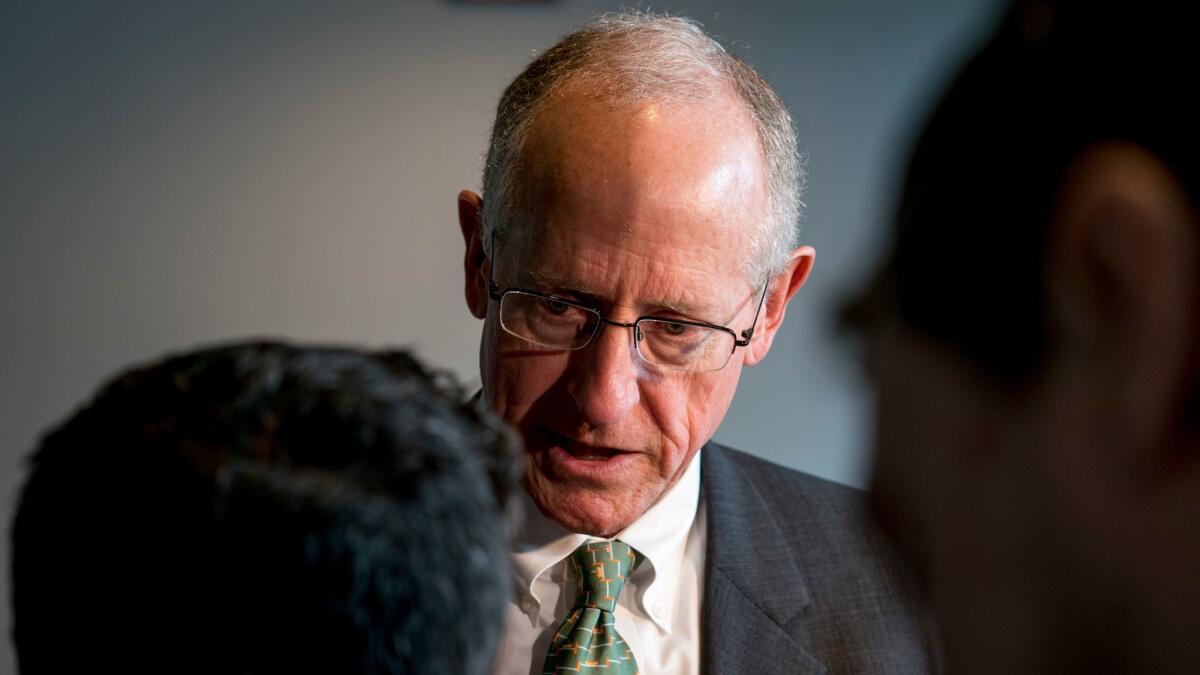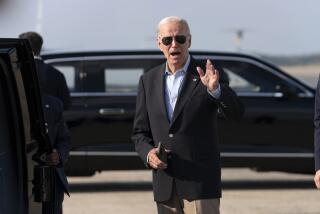Republicans wind down House Intelligence Committee’s Russia investigation, claiming no evidence of collusion

Republicans announced Monday that the House Intelligence Committee has not found any evidence of collusion
Reporting from Washington — After a yearlong investigation marred by bitter partisan divisions, Republicans announced Monday that the House Intelligence Committee has found no evidence of collusion between President Trump’s campaign and Russians who used social media and hacked emails in an effort to influence the 2016 election.
A draft 150-page report will be shared on Tuesday with Democrats, who have pressed for a more aggressive investigation than Republicans would allow, and who complained Monday that the panel’s work was incomplete.
The Republican report concludes that the Russian government’s extensive meddling in the campaign was not intended to help Trump beat Hillary Clinton. That puts the House Republicans at direct odds with the nation’s intelligence agencies, which assessed last year that the Kremlin specifically sought to undermine Clinton and assist Trump.
Guided in part by the aggressive committee chairman, Rep. Devin Nunes (R-Tulare), the investigation largely broke down in crude partisan infighting, marking a rare breach of decorum and tradition on a panel that conducts oversight of the nation’s intelligence community to prevent government abuses.
“This is the first time you really see one party using the gavel going after the intelligence community itself for partisan purposes,” Mieke Eoyang, a former committee staff member now at Third Way, a Washington think tank. “That is going to set back intelligence oversight for decades.”
The Republican conclusion gives Trump valuable political cover because it is the first congressional committee to support his repeated denials of any collusion with Russia. Like the president, the GOP-led panel also blamed former President Obama for what it calls a “lackluster” response to the Russian hacking and interference during the campaign.
The White House still faces the special counsel investigation led by Robert S. Mueller III, and that shows no sign of ending any time soon. Mueller’s team already has filed criminal charges against 19 people, including four former Trump campaign aides, and several are cooperating with federal prosecutors.
Two other congressional inquiries into Russian meddling also are underway.
The Senate Intelligence Committee has generally acted with bipartisanship and is working on a report about safeguarding U.S. elections.
But the Senate Judiciary Committee has faced partisan hurdles with squabbles between Sen. Dianne Feinstein of California, the ranking Democrat, and Sen. Charles E. Grassley of Iowa, the Republican chairman. Feinstein has issued her own requests for information from Trump associates and even released an interview transcript without committee approval.
Republicans on the House Intelligence Committee argued that their report will allow authorities to boost defenses against future outside meddling in U.S. elections, including the midterm election this November.
“We will now be moving into the next phase of this investigation,” said Rep. K. Michael Conaway (R-Texas), who has led the inquiry. “It’s important that we give the American people the information they need to arm themselves against Russian attempts to influence our elections.”
Democrats described the Republican conclusions as a smokescreen intended to protect the president.
“The majority has placed the interests of protecting the president over protecting the country, and history will judge its actions harshly,” said Rep. Adam B. Schiff (D-Burbank), ranking Democrat on the committee.

Schiff said the committee should investigate allegations of Russian money laundering. “If the Russians do have leverage over the president of the United States, the majority has simply decided it would rather not know,” he said.
Although completion of a draft report was announced abruptly Monday evening, Republicans had signaled for weeks that they were ready to wind down the investigation. They said the committee had conducted 73 interviews, mostly behind closed doors, and collected more than 300,000 documents.
Democrats will probably release their own report on the investigation, a reflection of the rancor that has defined the House investigation for months.
At one point, Republicans even discussed putting up a physical wall in one of the committee’s secured rooms to divide Democratic and Republican staff members. The plan was abandoned, according to sources with knowledge of the idea, a decision that had more to do with logistical concerns than any cooling of partisan animosity.
Lawmakers repeatedly accused one another of breaching confidentiality rules by leaking bits of closed-door testimony to skew public views of the evidence.
And the committee spent more than a month consumed by controversial allegations, advanced by Republicans and rebutted by Democrats, that federal law enforcement had improperly eavesdropped on a former Trump campaign foreign policy advisor, Carter Page, shortly before the election.
The committee’s work was troubled almost from the beginning after Nunes claimed in March 2017 that names of Trump associates were inappropriately revealed in classified reports. Nunes was embarrassed when it was revealed that he learned of the allegations during a secret visit to the White House complex.
Nunes, who served on Trump’s transition team, stepped aside from the Russia investigation while the House Ethics Committee examined whether he inappropriately disclosed classified information. He was cleared of wrongdoing in December, but he already was investigating allegations of wrongdoing by the FBI and the Justice Department.
The resulting four-page GOP memo argued that law enforcement inappropriately included opposition research funded by Democrats in an application for a surveillance warrant. The Foreign Intelligence Surveillance Court, which conducts its business in secret, approved the warrant and renewed it three times.
Trump’s allies used the memo to argue that the Russia inquiries, including the Mueller investigation, have been tainted by partisanship from the start. The president claimed the GOP memo “totally vindicates” him and hailed Nunes as “a man of tremendous courage and grit” who “may someday be recognized as a Great American Hero.”
Democrats later released their own 10-page memo rebutting the Republican allegations, saying the FBI and Justice Department handled the warrant appropriately and the surveillance court was told there were political motivations behind the opposition research.
Partisan tension flared again when Hope Hicks, the outgoing White House communications director, testified behind closed doors this month. Rep. Tom Rooney (R-Fla.) said leaks from the testimony, which he blamed on Democrats, showed it was time to end the House investigation.
“We’ve gotten to the point now where we’re literally bringing people in for nine hours just so the Democrats can leak to the press something as ridiculous as ‘white lies,’” he told CNN, referring to how Hicks reportedly admitted to fibbing on the president’s behalf.
Twitter: @chrismegerian
UPDATES:
5:40 p.m.: This article was updated with details of infighting on the House Intelligence committee.
This article was originally posted at 3:20 p.m.
More to Read
Get the L.A. Times Politics newsletter
Deeply reported insights into legislation, politics and policy from Sacramento, Washington and beyond. In your inbox three times per week.
You may occasionally receive promotional content from the Los Angeles Times.











